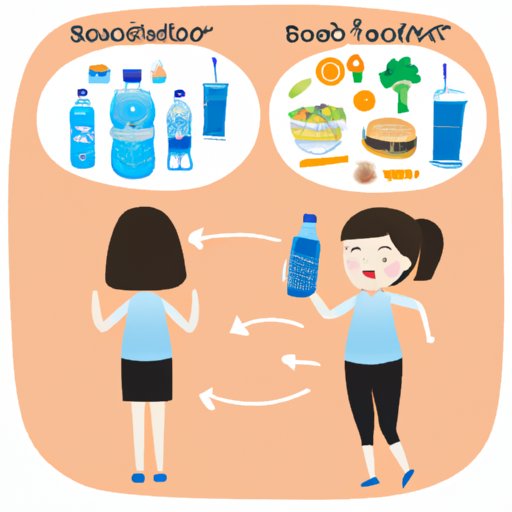Introduction
Bloating is an uncomfortable feeling of fullness in the stomach, often accompanied by abdominal pain and gas. It occurs when excess air or fluid accumulates in the digestive tract, leading to swelling and discomfort. While it can be caused by a variety of medical conditions, there are several lifestyle changes that can help reduce bloating. In this article, we will explore the causes of bloating and provide tips for reducing it.
Drink Plenty of Water
Staying hydrated is essential for overall health and can help reduce bloating. According to a study published in the journal Appetite, dehydration can lead to increased feelings of hunger, which can cause people to eat more than they need and become bloated. Drinking enough water can help prevent this from happening.
To increase water intake, try carrying a water bottle with you throughout the day. You can also add flavor to your water by adding slices of lemon, lime, or cucumber. Additionally, avoiding caffeine and alcohol can help reduce bloating, as both of these can act as diuretics and cause dehydration.
Eat Foods Rich in Fiber
Eating high-fiber foods can help move food through the digestive system, reducing bloating. Good sources of fiber include fruits, vegetables, whole grains, legumes, and nuts. Eating a balanced diet that includes these foods can help keep your digestive system running smoothly and reduce bloating.
Fiber has many other health benefits as well. According to the Harvard T.H. Chan School of Public Health, consuming adequate amounts of fiber can lower cholesterol, improve blood sugar levels, and reduce the risk of heart disease and stroke.
Avoid Carbonated Beverages
Carbonated beverages are one of the main culprits of bloating. The carbon dioxide in these drinks can cause gas to build up in the stomach and lead to bloating. To reduce bloating, it’s best to avoid carbonated drinks completely.
If you’re looking for an alternative to carbonated drinks, try herbal teas or infused waters. These are great options for adding flavor to your water without any added sugar or carbonation. You can also try adding fresh fruit or herbs to your water to give it a refreshing taste.
Exercise Regularly
Regular physical activity can help move gas through the digestive tract, reducing bloating. Studies have shown that aerobic exercise can help reduce bloating by increasing circulation and improving digestion. To maximize the benefits, aim for at least 30 minutes of moderate-intensity exercise per day, such as walking, jogging, cycling, or swimming.
Additionally, yoga and Pilates can help reduce bloating. These types of exercises focus on gentle stretching and breathing, which can help relax the digestive muscles and reduce gas.
Limit Processed Foods
Processed foods are often high in sodium, which can cause the body to retain water and lead to bloating. To reduce bloating, limit your intake of processed foods and opt for healthier alternatives instead. Fresh fruits and vegetables, lean proteins, and whole grains are all good choices.
If you do choose to eat processed foods, look for low-sodium options and read nutrition labels carefully. Also, make sure to drink plenty of water after eating processed foods to help flush out any excess sodium.
Conclusion
Bloating can be an uncomfortable experience, but it doesn’t have to be a permanent problem. By making simple lifestyle changes, such as drinking plenty of water, eating high-fiber foods, avoiding carbonated beverages, and limiting processed foods, you can reduce bloating and feel more comfortable.
For more information about how to reduce bloating, consult your doctor or nutritionist. They can provide personalized advice based on your individual needs.
(Note: Is this article not meeting your expectations? Do you have knowledge or insights to share? Unlock new opportunities and expand your reach by joining our authors team. Click Registration to join us and share your expertise with our readers.)
